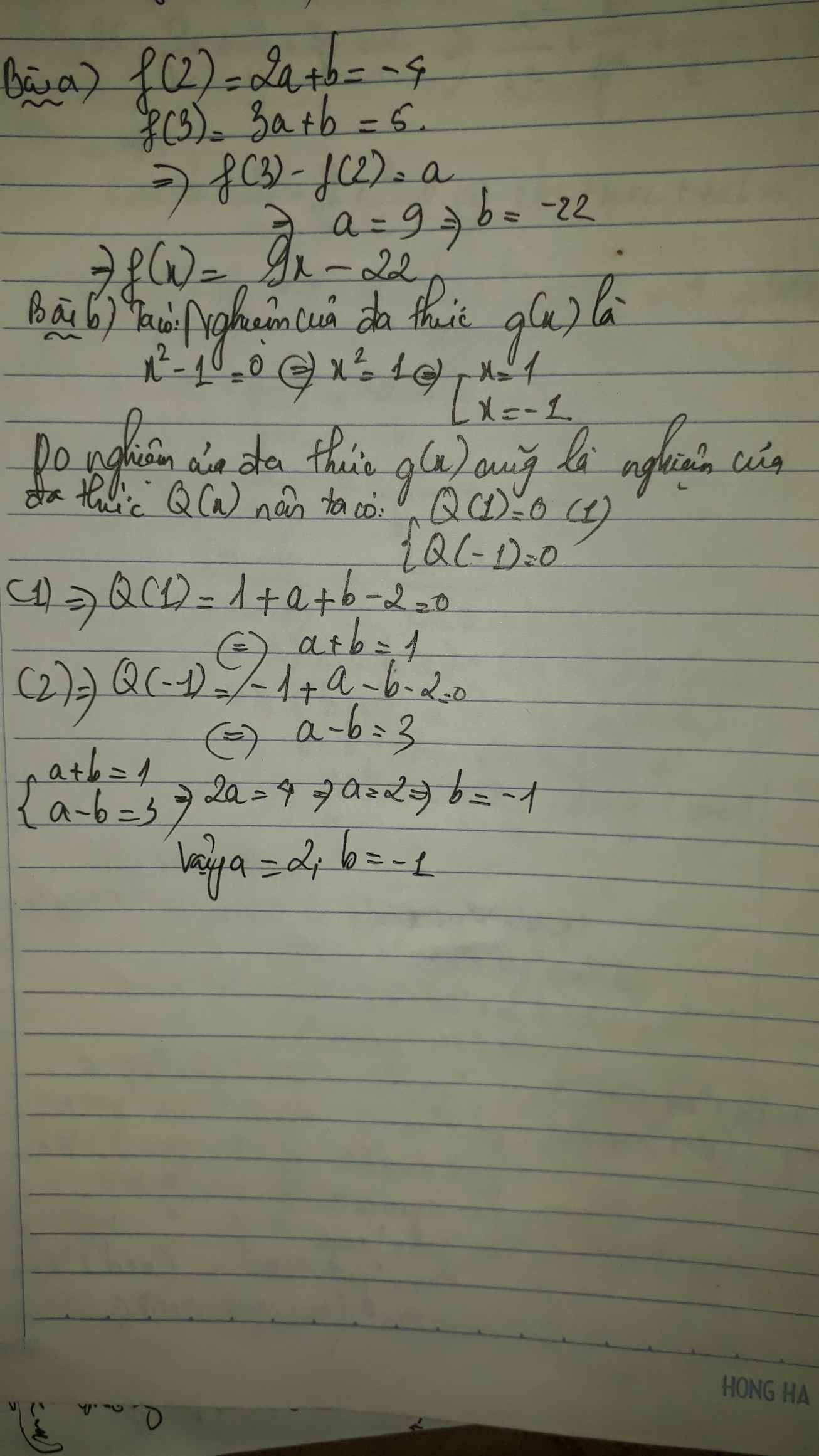Hãy nhập câu hỏi của bạn vào đây, nếu là tài khoản VIP, bạn sẽ được ưu tiên trả lời.

a: M(1)=3
M(-2)=2
=>a+b=3 và -2a+b=2
=>a=1/3 và b=8/3
b: G(-1)=F(2)
=>(a+1)*(-1)^2-3=5*2+7a
=>a+1-3-10-7a=0
=>-6a-12=0
=>a=-2

a)f(x)+g(x)=10xmũ2-8x+ 14/3
b)f(x)-g(x)=10x mũ 2 +4x+16/3
nghiệm chưa tính ddcj nha
a;\(f\left(x\right)+g\left(x\right)=\left(5x^2-2x+5\right)+\left(5x^2-6x-\frac{1}{3}\right)=25x^2-8x+\frac{1}{4}\)
b'\(f\left(x\right)-g\left(x\right)=\left(5x^2-2x+5\right)-\left(5x^2-6x-\frac{1}{3}\right)=4x+\frac{16}{3}\)
c;\(f\left(x\right)-g\left(x\right)=0\Leftrightarrow4x+\frac{16}{3}=0\)
\(\Leftrightarrow4x=-\frac{16}{3}\)
\(\Leftrightarrow x=-\frac{4}{3}\)
Vậy nghiệm của đa thức f(x)-g(x) là : x=-4/3

a) Để đa thức f(x) có nghiệm là 1 và 3 thì \(1^3-a.1^2-9.1+b=3^3-a.3^2-9.3+b=0\)
=> \(1-a-9+b=27-9a-27+b\)
=> \(-a+9a+b-b=8\Rightarrow8a=8\Rightarrow a=1\)
Từ đó tính được b = 9.
b) Thay kết quả câu a vào f(x) ta được f(x) = \(x^3-x^2-9x+9\)
Đa thức f(x) có nghiệm khi:
\(x^3-x^2-9x+9=x^2\left(x-1\right)-9\left(x-1\right)\)
\(=\left(x^2-9\right)\left(x-1\right)=0\Rightarrow\orbr{\begin{cases}x^2-9=0\\x-1=0\end{cases}}\)
Từ đó tìm được tập nghiệm của f(x) là {-3;1;3}.

a) f(x) = x(x - 5) + 2(x - 5)
x(x - 5) + 2(x - 5) = 0
<=> (x - 5)(x - 2) = 0
x - 5 = 0 hoặc x - 2 = 0
x = 0 + 5 x = 0 + 2
x = 5 x = 2
=> x = 5 hoặc x = 2
a, f(x) có nghiệm
\(\Leftrightarrow x\left(x-5\right)+2\left(x-5\right)=0\)
\(\Rightarrow\left(x-5\right)\left(x+2\right)=0\)
\(\Rightarrow\orbr{\begin{cases}x-5=0\\x+2=0\end{cases}}\Rightarrow\orbr{\begin{cases}x=5\\x=-2\end{cases}}\)
->tự kết luận.
b1, để g(x) có nghiệm thì:
\(g\left(x\right)=2x\left(x-2\right)-x^2+5+4x=0\)
\(\Rightarrow2x^2-4x-x^2+5+4x=0\)
\(\Rightarrow x^2+5=0\)
Do \(x^2\ge0\forall x\)nên\(x^2+5\ge5\forall x\)
suy ra: k tồn tại \(x^2+5=0\)
Vậy:.....
b2,
\(f\left(x\right)=x\left(x-5\right)+2\left(x-5\right)\)
\(=x^2-5x+2x-10\)
\(=x^2-3x-10\)
\(f\left(x\right)-g\left(x\right)=x^2+5-\left(x^2-3x-10\right)\)
\(=x^2+5-x^2+3x-10=3x-5\)
